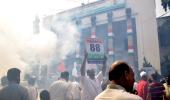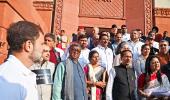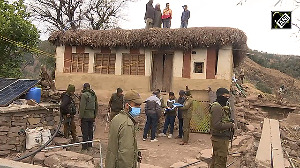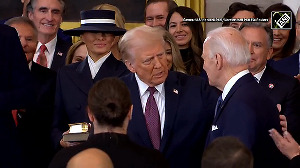For the BJP, Telangana is a sunrise state in the South, while Karnataka is a southern success despite the ups and downs.

The Congress' lone success in Telangana among the five states that voted in November triggered a fresh, polarising debate on the 'North-South' political divide.
The argument, presented by politicians from the Congress and its Tamil Nadu ally, the Dravida Munnetra Kazhagam, was predicated on the Congress' victories in the Karnataka assembly polls in May 2023, followed by Telangana.
The Congress also picked up a significant share of its 52 Lok Sabha seats from Kerala (15 of 20) as the leader of the United Democratic Front and eight (of 39) from Tamil Nadu as a constituent of the DMK-helmed Secular Progressive Alliance.
However, the Congress drew a blank in Andhra Pradesh, got just three of 17 in Telangana -- one less than the Bharatiya Janata Party -- and one of 28 in Karnataka.
Punjab, where it secured eight of 13 seats, was its only solace north of the Vindhyas.
The BJP's second term at the Centre was marred by perceptions of a geographical cleave, created largely by the DMK's campaign around a series of issues.
The DMK staunchly opposed the Centre's National Education Policy as well as the National Eligibility-cum-Entrance Test on the ground that, instead of fostering a scientific and technological temper, the NEP safeguarded the caste hierarchy, facilitated backdoor entry for the imposition of Hindi, transferred the educational mandate of the states to the Centre, and deprived rural children of their education rights.
The DMK ramped up its opposition to the Centre when Udayanidhi Stalin, a minister in his father's and Chief Minister M K Stalin's Cabinet, questioned the tenets of Sanatana Dharma as inimical to social justice and equality.
The flashpoint came on December 3 when the BJP swept the heartland, leaving the Congress with just Telangana.
The Congress bit the bait on the day of the results.
'THE SOUTH' exclaimed Karti Chidambaram, the Congress's Sivaganga MP, on X as if to accentuate the rupture, while Praveen Chakravarty, who chairs the party's data analytics department, said in an X post, 'The South-North boundary line is getting thicker and clearer.' He deleted the post, but screenshots were available.
To exacerbate matters, when Parliament opened for the winter session, DMK MP D N V Senthil Kumar alluded to the heartland states where the BJP won with a pejorative term and stated that the party could never breach the South.
The Congress and even the DMK were compelled to counterbalance such assertions, which cast serious doubts over the Congress' contention of being the only pan-Indian party against the BJP by giving the impression that it aimed to be just a southern force.
Senthil Kumar apologised, while Stalin gave an interview to a leading Hindi daily in which he toned down his son'ss comments.
'Congress doesn't believe in any regional divide,'Randeep Singh Surjewala, Congress general secretary and Rajya Sabha MP, said, adding, ' North India's stellar contribution to the freedom struggle is recorded history.'
'How can we forget Gujarat's contribution to industry or that the original industrial revolution (in India) began in Kanpur and Panipat?
'Or how Assam revolutionised the tea industry, or how the National Capital Region emerged as a software intellectual hub with Chennai and Bengaluru?'
B K Hari Prasad, a Congress Working Committee member and a member of the Karnataka legislative council, said, 'There is nothing like the North and South. We are Indians from the South. As a party that led the freedom struggle, we are pan-national.'
However, the BJP refused to be persuaded by such arguments.
'Congress is dividing the North and South on caste and language. It follows the British divide-and-rule policy,' Anil Baluni, its national chief spokesperson, remarked.
To Vanathi Srinivasan, a member of the Tamil Nadu assembly from Coimbatore South and head of the BJP's women's wing, the BJP holding on to its vote share in Karnataka despite the setback in the last assembly election and increasing its vote share in Telangana was adequate proof that it was 'growing' in the South.
For the BJP, Telangana is a sunrise state in the South, while Karnataka is a southern success despite the ups and downs.
In the 2019 Lok Sabha polls, of Telangana's 17 seats, the BJP won four with a 19.7 vote per cent, while the Congress got three seats but posted a 28.8 vote per cent to the Bharat Rashtra Samithi's nine seats and 41.7 vote per cent.
In the just concluded assembly polls, the BJP picked up eight seats and doubled its vote share from 7.1 per cent in 2018 to 13.9 per cent, which is still substantially behind the Congress and BRS' 39.4 and 37.3 per cent.
More significant is the BJP's electoral trajectory in Karnataka.
In the 2018 state polls, it won 104 seats (short of a majority) and secured 36.2 vote per cent to the Congress' 80 seats and 39 per cent.
But months later, the BJP turned in a spectacular showing in the Lok Sabha polls, winning 25 of the 28 seats and recording 51.7 vote per cent, while the Congress was left with only one seat and 32.1 vote per cent.
In the 2023 assembly polls, the BJP was outdone by the Congress.
It won 66 seats to the Congress' 135 and secured a vote per cent of 36 to the Congress' 42.9.
In Tamil Nadu and Andhra, it will perforce have to seek the hands of regional parties to achieve a breakthrough.
Feature Presentation: Aslam Hunani/Rediff.com












 © 2025
© 2025